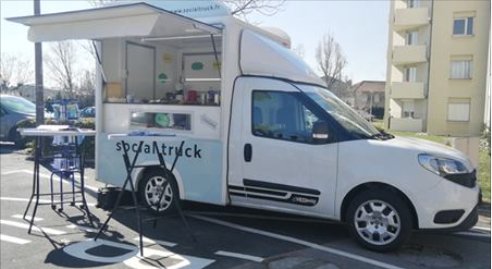
Food Truck Rental: The Ultimate Solution for Your Mobile Food Business
March 17, 2025
Aperol Cocktail Trucks set the standard
April 20, 2025Promotional vehicles and food trucks for social programs and public services
In recent years, promotional vehicles and food trucks have emerged as dynamic mediums for delivering social programs and public services. These mobile units serve not only as a means to reach citizens but also play a critical role in community engagement and outreach efforts. The ability to bring services directly to the people in a more approachable and interactive manner is vital, especially in a society that values convenience and accessibility. This trend has allowed organizations—from non-profits to government agencies—to foster a stronger connection with their target audience through food, information, and services, all packaged within the unique offering that food trucks provide.
The concept of using vehicles and food trucks for social programs transcends traditional marketing strategies. Rather than simply advertising, these mobile units become platforms for education and interaction. They allow organizations to create a face-to-face connection with community members, which is especially beneficial in underserved areas. By combining food with informative resources, organizations can increase attendance and engagement, providing necessary services such as health screenings, education on social services, and food distribution. The strategy also utilizes the universal appeal of food as a catalyst for discussion, learning, and community building.
Moreover, food truck rental services offer flexibility and cost-effectiveness for groups looking to organize a community event or outreach initiative. By leveraging these mobile kitchens, organizations can host events that serve food while distributing essential supplies or information related to public services. The food truck model allows for a low-barrier entry point for participation, inviting crowds to enjoy good food while promoting social good. The casual environment created by a food truck fosters a sense of belonging and attracts individuals who might otherwise avoid traditional outreach methods.
As we delve deeper into the potential of promotional vehicles and food trucks in community service, we will explore how these vehicles can be optimally utilized. We’ll examine the impact they have in various spheres, from health initiatives to educational campaigns, providing insight into the profound effects they can have on society. With this exploration, we aim to illustrate the vital relationship between food trucks and social programming and how they are transforming the way we engage with the public.
The Role of Food Trucks in Social Programs
The integration of food trucks into social programs has proven to be a game-changer in reaching communities efficiently. Traditionally, social services have faced challenges in connecting with individuals, especially in remote or marginalized areas. Food trucks break down these barriers by offering a tangible incentive for community members to engage. They not only serve food but also act as mobile information hubs, spreading awareness on various issues, from health services to educational resources. Importantly, the ability to physically bring services to the neighborhoods where they are needed most amplifies outreach and encourages participation among those who may shy away from conventional service locations.

Moreover, promotional vehicles equipped as food trucks can host specific health initiatives, such as vaccination drives or health screenings. These services become more accessible to the general public when delivered in an inviting atmosphere centered around food. For example, organizing a health fair complete with complimentary meals can incentivize families to attend and receive necessary health screenings. Additionally, these programs can be tailored to meet the unique needs of diverse populations, ensuring that the services provided are culturally relevant and well-received.
Engaging local chefs or food entrepreneurs in these initiatives gives an authentic touch to the experience while supporting local businesses. This collaboration can enhance the overall quality of the food served, ensuring that participants eat well while they learn about vital community resources. Ultimately, the role of food trucks extends beyond merely providing nourishment; they become vital vehicles for change, equality, and inclusivity in social programs and public services.
Impact on Community Engagement
The use of food trucks as vehicles for social programs significantly impacts community engagement. One of the most notable effects is the establishment of trust between organizations and community members. By presenting essential services in a familiar and friendly environment, organizations reduce the intimidation factor often associated with accessing public services. This newfound trust fosters deeper connections and encourages ongoing participation in various community initiatives.
Furthermore, food trucks inherently create a social atmosphere where individuals can gather, share stories, and build relationships. These interactions can lead to stronger community bonds and collective identity, promoting a sense of belonging. Food events that involve cooking demonstrations or interactive activities contribute to creating a vibrant community setting where participants feel valued and engaged. Such environments allow organizations to better understand the community’s needs while simultaneously educating attendees about available services.
By integrating technology into these engagements, such as using smartphones to sign up for services or providing resource information via QR codes, organizations can further streamline the outreach process. The fusion of technology with the informal setting of a food truck event not only enhances engagement but also encourages modern communication methods. Social media plays a crucial role in promoting these events, allowing community members to share their experiences and invite others to participate, thus increasing overall visibility and turnout.
Challenges and Solutions in Implementing Food Truck Programs
While the benefits of using vehicles and food trucks for social programs are substantial, there are challenges that organizations may face in implementation. One of the primary hurdles is navigating local regulations regarding food service and mobile vendors. Each state or municipality may have different rules concerning health inspections, licensing, and permits required for operating food trucks. Organizations must thoroughly research these regulations and ensure compliance to avoid legal complications that could hinder program execution.
Moreover, funding issues can arise, particularly for non-profits seeking to implement food truck initiatives. Even though food truck rental costs can be relatively low, the associated expenses such as staffing, supplies, and promotional materials can add up quickly. To address this, organizations can consider partnering with local businesses or applying for grants specifically aimed at community outreach programs. By collaborating with established networks, they can share resources and reduce individual financial burdens, ultimately bringing programs to fruition seamlessly.
Additionally, effectively marketing food truck events is crucial to ensuring maximum outreach. Organizations need to invest time and resources into marketing strategies that connect with their target demographics. Utilizing social media platforms to announce food truck locations and event details can be an effective approach. QR codes on flyers and posters can lead community members directly to sign-up pages or provide additional information. Planning events during times when community members are most likely to be available, such as weekends or evenings, can further enhance attendance and engagement.
Conclusion
In conclusion, the integration of promotional vehicles and food trucks for social programs and public services holds immense potential for community empowerment and engagement. These mobile units break down barriers, providing access to essential services in an approachable and inclusive manner. The fusion of food and public service serves not only as a method of nourishment but also as a powerful tool for connection and community building. The impact they have on engaging underserved populations emphasizes their importance in contemporary community service models.
The unique versatility that food trucks offer allows organizations to explore innovative outreach methods while fostering relationships with community members. By establishing trust and creating social interactions, they pave the way for ongoing participation in community initiatives. In addition, creative partnerships and collaborative funding strategies open new avenues for implementing successful programs, enabling organizations to overcome challenges associated with logistics and financing.
As we move towards a more inclusive future, the ongoing utilization and development of vehicles and food trucks for social programs will be crucial. By continually adapting these models to address the evolving needs of communities, we can ensure that essential services reach those who need them most. The synergy created through food, engagement, and resource sharing leads to stronger, healthier, and more connected communities. No longer are food trucks merely vendor units; they stand at the forefront of community service innovation, bridging the gap between need and opportunity. As we embrace this dynamic approach towards social programs, we open doors to a future where every community member is equipped with the resources and connections needed to thrive.


